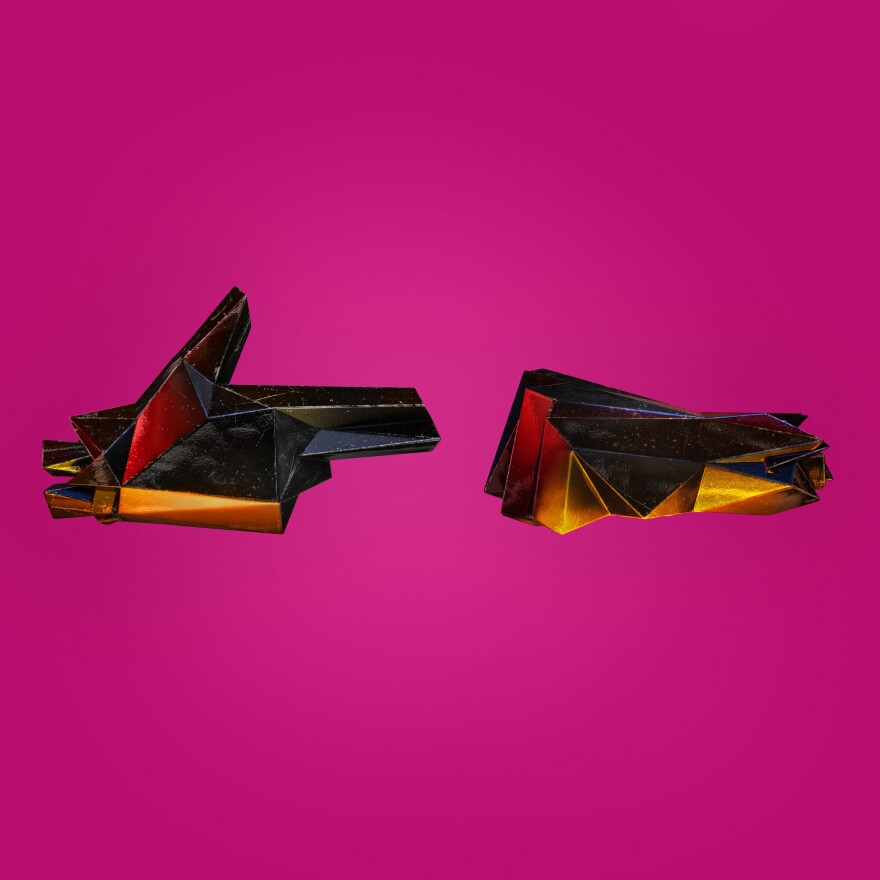The hip-hop duo Run the Jewels is keenly aware of what's going on in the world around them. And though the group has never consciously planned it, its previous album releases have seemed to capture the mood during times of upheaval, from the acquittal of George Zimmerman to the 2016 election. Run the Jewels' fourth album, RTJ4, was released a couple of days ahead of schedule on June 3; even though it was written and recorded well before police killed George Floyd on May 25, they once again meet the moment.
Jaime Meline and Michael Render were career artists before they met 10 years ago. Their professional identities — El-P and Killer Mike, respectively — had fan bases, but it wasn't until they went on tour as Run the Jewels that they really clicked with audiences.
"It was surreal," El-P says of that first tour. "Mike would do a set, I would do a set. We'd go offstage for five minutes, come back on together, and do the Run the Jewels album, and it was literally like they didn't think that it was the same people. And we'd just be looking at each other like, 'We didn't even change our shirts.' And they were throwing the hand sign up."
The "hand sign" is actually two hands, one making the shape of a gun and the other making a fist. If one were to "run the jewels," it would be a stick up, and the fist would be handing over a chain. The gesture has been taken up by the group's fans, who've given it their own meaning.

"I've seen Run the Jewels thrown up on top of mountains, after lawyers won class action suits on the behalf of people — doctors that have successfully pulled surgeries off," Killer Mike says.
"Parents after they've literally had their child," El-P interjects.
"Yeah, and I respect and revere that relationship more than I can express in words to them," Killer Mike says. "Because these are regular, everyday people."
The hand sign is the only thing on the covers of each of their albums. El-P came up with it.
"I wanted to do the hand sign because I wanted something powerful and elemental and non-pretentious," he explains. "It just made it really easy to communicate."
And how much it did communicate surprised him.
"The friendship that me and Mike had and what was coming through with the music was somehow naturally and almost mistakenly connecting with something really much bigger than us," El-P says. "And all the stuff that Mike's talking about, about seeing people throw the symbol up — they gave that definition way more than we gave it definition."
Killer Mike remembers the origins of his group fondly.
"I keep the picture always, of his pudgy little white fingers looking beautiful, pointing at that fist and that chain and it just like — that symbol didn't need explaining," he says.
The plain fact of the love and solidarity between a black man from Atlanta and a white man from New York is not lost on their audience.
"There's a set of guys that come to our shows in Nashville. And they're best of friends," Killer Mike says. "One is black and one is white. Those guys' friendship is validated through hip-hop fandom and we don't ever have to make overtly political things to say, 'Your friendship is valid.' All we gotta do is be dope so they can show up dressed like a more fit version of El-P and I and rock the f*** out. And that's what is special."
"What we realized was these kids just simply love seeing what they know in their heart," El-P adds. "Let's be honest, artists don't have much use except the eloquent expression of something everybody would like to be able to say but just don't have the f****** time to work on it."
What El-P and Killer Mike have been saying — that America is riven by inequality and corruption — can no longer be deemed a niche understanding of how things are.
"The second that what I'm thinking and writing about on some of these songs is completely inapplicable to reality, the second that humanity is in a better place," El-P says.
All four Run the Jewels release dates have an uncanny synchronicity with incidents of state violence that rise to national attention, but that's a contextualization imposed from outside their partnership
"In my mind, things are never not happening," Killer Mike says.
Run the Jewels did not intend for its new album to enter the world less than two weeks after Minneapolis police killed George Floyd. The duo was going to drop it just before its now postponed tour began in mid-March, which still would have paired it with the death of Breonna Taylor, who was shot in her home by the Louisville police.
Because of the responsibility they feel to their audience, El-P and Killer Mike refuse to sugarcoat what they know to be true.
"Nina Simone is far more honest about what the times were than the New York Times at the time," Killer Mike says. "James Brown's music was a lot more honest at that time than the Atlanta Journal-Constitution was. Because artists, part of what we do is to be a speaker box for society at a particular time."
And what RTJ4 does is make it obvious how much power regular, everyday people have.
Copyright 2021 NPR. To see more, visit https://www.npr.org.


